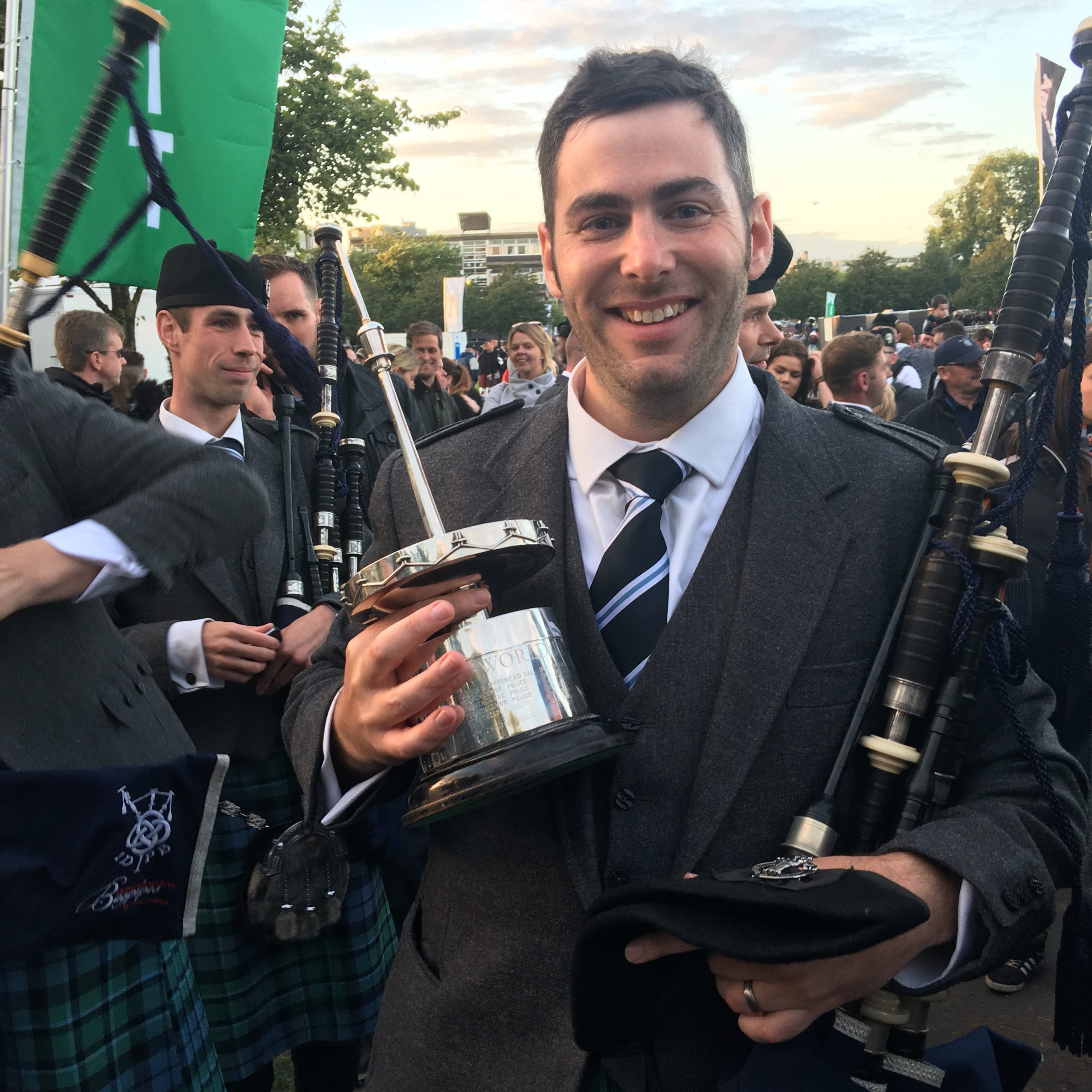There's no best way to tune your bagpipes
Actually, there absolutely seems to be a
"best way" to tune your bagpipes.
Bagpipe tuning is a complex problem, there's no doubt about it. It's a tough thing to do. We've got so much to try to manage – three different drones, a finicky chanter, weather conditions, bagpipe maintenance, steady blowing, reed selection, pipe bag selection...
It's pure madness.
In late 2022, frustrated trying to help our Dojo community figure out the tuning problem, I set out to create a new course that would settle all of this once and for all. I thought: "I have a process that's served me well in 30+ years of playing around the world... it's time to really dig deep and de-mystify the process so everyone can benefit."
Six months later, as I was finally finishing up a rough draft of what the course would entail, a hypothesis started to emerge... "Wait a minute, this isn't just the way I tune my pipes – I think this is the way we all tune our pipes."
That would be a powerful breakthrough – to actually crack the code of bagpipe tuning and share it with the world.
From this, another idea popped into my head. Why don't I just ask some great pipers, and make that part of the course?
And so, I decided to reach out to the best pipers I knew to basically interview them about bagpipe tuning. I proceeded to record hour-long interviews with Jack Lee, Stuart Liddell, Richard Parkes, Roddy MacLeod, Matt MacIsaac, Jim McGillivray, Dr Matt Welch, Lincoln Hilton, Robert Mathieson, Colin MacLellan, and Callum Beaumont.
Sure enough, the conclusion from all of these in-depth conversations was:
All excellent pipers are basically doing it the same way.
And, it's not magic either. It's a very specific process, centuries old, that pipers have honed and informally passed down to each other for centuries.
Really, in drafting my Tuning Course, I had taken this informal process and made it formal, and easy to follow.
Today, I'm excited to share the finished result of a whole suite of bagpipe tuning materials I've affectionately named "The Great Bagpipe Tuning Algorithm."
Enter... the Algorithm
Master bagpipers employ a well-developed, fairly universal bagpipe-tuning algorithm to get their pipes in tune. They might not call it an "algorithm" ... but that's what it is.
The all-encompassing "bagpipe tuning suite" that I'm introducing to you today is going to help you develop that algorithm for yourself, so you too can become a tuning master!
Before we get too far, though, I want to just pause to think about algorithms for a moment or two.
The term “Algorithm” might seem intimidating or scary, especially when we hear about Algorithms’ role in social media and how they can influence our online experiences. But in reality, algorithms are nothing more than a series of steps or instructions to help us solve problems or complete tasks more efficiently. They exist in various forms, from simple recipes for cooking to more complex strategies for organizing our daily schedules. We often use algorithms without even realizing it, as they help us make decisions, prioritize tasks, and navigate through our day-to-day lives.
When faced with any worthwhile complex task, having an algorithm to guide us can make the process more manageable and increase the chances of success. By breaking down the task into smaller steps or components, we can focus on each part individually and gradually work our way towards the desired outcome. An “algorithmic” approach can be applied to numerous aspects of our lives, from personal goals to professional projects.
And starting today, we'll benefit from approaching bagpipe tuning algorithmically.

Duncan Macleod
"I've already been able to lock my drones in with much more confidence. But more than that, I'm not tempted to think that there is some tricky explanation for why my pipes are out of tune. The truth is, the more you practice this and understand the environmental and mechanical impacts on your tuning, the more that you can become an independent bagpiper who can tune their own pipes by your own ear to a level that is far superior to what you'll generally see being done out in the field."
The Great Bagpipe Tuning Algorithm Suite Is...
Part 1: Bagpipe Tuning in Theory – Online Course
A complete theoretical course covering the complete A-to-Z of bagpipe tuning. Using the "algorithm" framework, we discuss what the end-goal of tuning is, the specific procedures and skills we'll develop to achieve that end goal, and then we go into detail about what sorts of variables we are certain to have to deal with during our tuning journey.
Contains audio, text, videos, graphics, and quizzes to test your knowledge.
▶ Click here to learn more, or simply scroll to keep reading!
Part 2: Bagpipe Tuning in Practice – Online Course
A second course focused on applying your theoretical knowledge from part 1.
Now that we know the objectives, it's time to develop key procedures that we will hone in order to tame the seemingly-infinite variables that make bagpipe tuning an every-day challenge.
▶ Click here to learn more, or simply scroll to keep reading!
Part 3: 90-Day Tuning Plan – Online Training
So, we've just inhaled a lot of knowledge, both theoretical and practical. Now what?
Part 3 of the course is a detailed 90-day tuning training protocol, designed to take an average of 5 minutes per day. Each day during the training is outlined for you, and video examples are given so you're totally clear on what to do. You'll be thrilled with the results of this plan, guaranteed.
▶Click here to learn more, or simply scroll to keep reading!
Part 4: Tuning Interviews with the Greats
Part 4 contains 11 one-hour tuning interviews, in video and audio formats, with Richard Parkes MBE, Jim McGillivray, Roddy MacLeod MBE, Lincoln Hilton, P/M Robert Mathieson, Stuart Liddell MBE, Dr Matthew Welch, Colin MacLellan, Callum Beaumont, Jack Lee, and Matt MacIsaac.
▶ Click here to learn more, or simply scroll to keep reading!
Part 5: How to Tune Your Pipe Corps Algorithmically – Online Course
Let's take the knowledge and experience we've developed in the process of learning to tune ourselves, and apply it to our pipe corps. That's really all it is.
There are no new skills needed when it comes to tuning a pipe corps, we just need a couple of additional strategical goalposts to keep our bearings.
▶ Click here to learn more, or simply scroll to keep reading!
300-page Textbook, Mailed to You
I don't know about you, but I love a physical book, especially when it's time to get my eyes away from a screen, and sit down for some focused learning.
With the purchase of our Tuning Suite, we'll mail a beautiful print distillation of the course material to your door. It's full color, 297 pages, and also contains transcripts of my 11 tuning interviews with famous pipers.
▶ Click here to learn more, or simply scroll to keep reading!
A Triple-Your-Money-Back* Guarantee
* = (yes, triple.)
On the condition you do your best to consume the materials in this course, and you're not successful (or not happy) with the results, we'll triple the money you paid into the course.
▶ Click here to learn more, or simply scroll to keep reading!
Tuning Product Bonuses
We reached out to see if our favorite Dojo product manufactures would pitch in to help you succeed with your tuning. Purchase today, and be eligible to receive the following (while supplies last)...
- $100 off a set of MacLellan Bagpipes
- 2 Free Reeds from Castle Bagpipes (You just pay shipping)
- 1 free month of Dojo University Premium (for non-current members)
- 2 free months of credit for existing Premium Members
▶ Click here to learn more, or simply scroll to keep reading!
3 Components of the "Bagpipe Tuning Algorithm"
How will we navigate the challenges of bagpipe tuning?

Bagpipe Tuning Algorithm Components
What is our desired output?
Google Maps employs a miraculous, complicated navigational algorithm. But, the desired output is quite simple – we just need clear instructions that gets us to where we want to go as optimally as possible.
Bagpipe tuning inputs and processes can be quite complicated as well (and actually, that's an understatement!), but the desired output is simple! In our bagpipe tuning learning suite, we'll get totally clear on what "in tune" actually means. This is always our end goal, regardless of playing level or application.
What procedures will we use?
Computer algorithm procedures take a variety of inputs, and transform them into the desired outputs. We'll do the same thing with our bagpipe tuning procedures.
In our course, we'll look at the two key procedures successful pipers across the centuries have learned to master (and all in almost exactly the same way). Once the bagpipe is set up properly, and the piper is blowing steadily, there really are only two procedures necessary to tune yourself, to develop your ear, and to grow your confidence...
These two procedures are also all you need to tune your pipe band as well!
Getting real about bagpipe tuning inputs
In Google Maps, there are a whole bunch of inputs the algorithm has to be able to deal with in order to give the best output. Where is point A? Point B? How much traffic is there along various possible routes? Does the user want to avoid tolls? Want to maximize fuel efficiency? Do they need to make stops along the way?
It's the large number of possible inputs that make algorithms necessary. And, it's why a bagpipe tuning algorithm is necessary.
How are your pipes configured? How steadily are you blowing? What is the temperature inside your bag? The humidity? How about condensation? What's the external environment like? Are you playing at high altitude? How long can you warm up before you perform?
In our course, we will learn to understand all of these complicating "inputs", and "process" them efficiently and masterfully, to produce a magnificent "output" – that output is great bagpipe sound.
Get your "desired output" today!
Finally, Fear Love the Process of Tuning Your Bagpipes
By learning and executing the bagpipe tuning algorithm we'll solve many common tuning problems and misconceptions along the way.
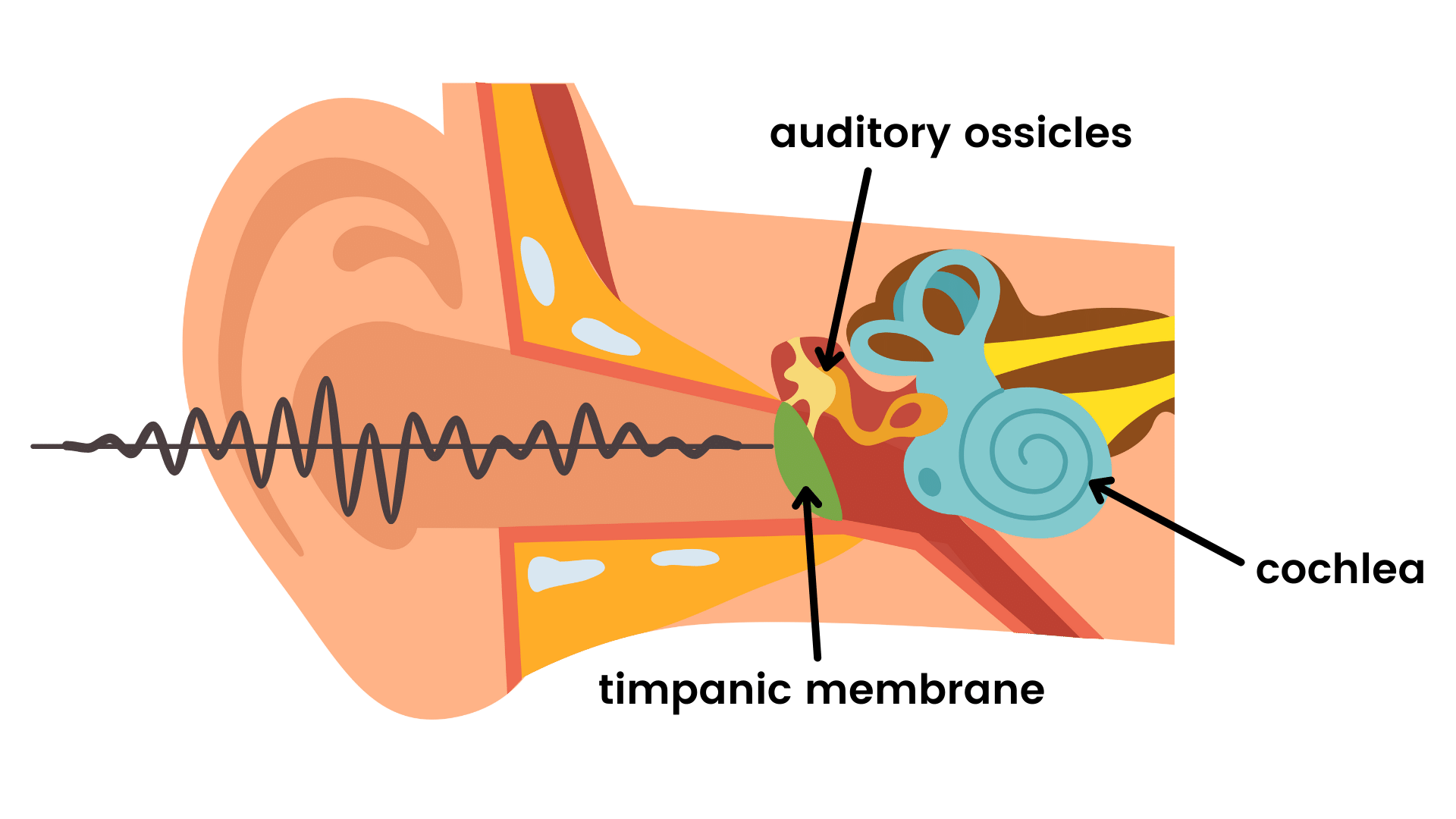
First things first – you have the ear.
The first myth we can dispel is the idea that "some people have a good ear, but I don't."
Have a listen to this excerpt from the course.
Can you hear the beating, and when beating gets better or worse? If you can generally follow along with this lesson, you have a perfectly good ear for bagpipe tuning. We have skills we'll need to learn and practice, but your ear isn't bad. You're not "tone deaf."
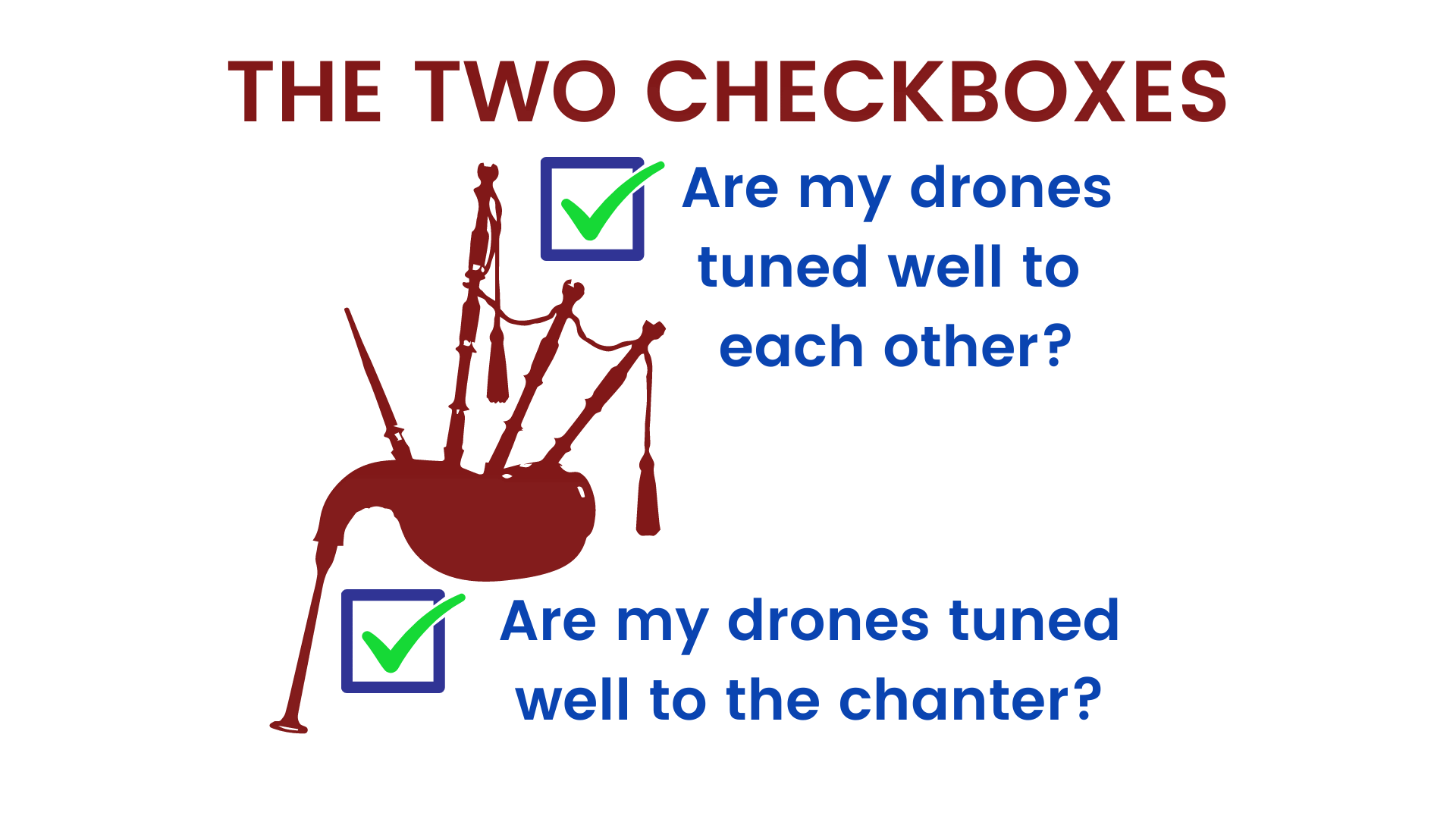
Tuning can be simple.
There are a lot of variables that cause the tuning of the bagpipe to be regularly changing, and therefore challenging. However, there are really only 2 or 3 core skills we need to practice and develop to become great tuners. At the end of the day, we just need to (1) get the drones locked in together, and (2) tune the chanter intervals to the drones.
We'll do a deep dive into these tuning skills in the course. Once you can do these basic skills, you'll be able to handle any new tuning variable that jumps out at you.
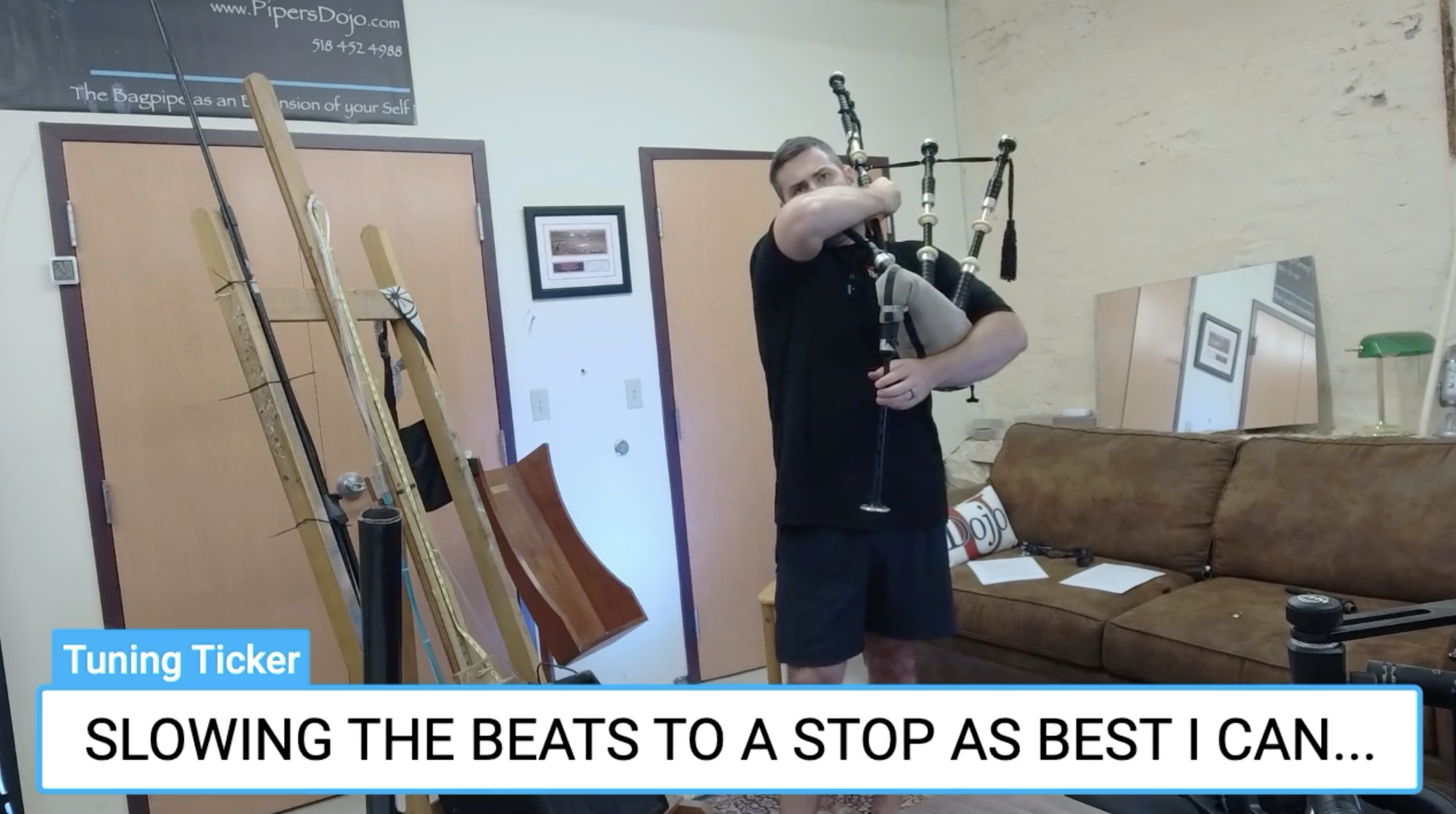
Finally learn to "hear it."
Many pipers just "can't hear it" at first. This tuning suite contains all the resources you need to train that ear of your to recognize what's "in," and what's "not in."
Is the bass drone harder to get into tune than the tenors? Yep! But, we will teach you tactics to cope with this and to master this skill just like any other.
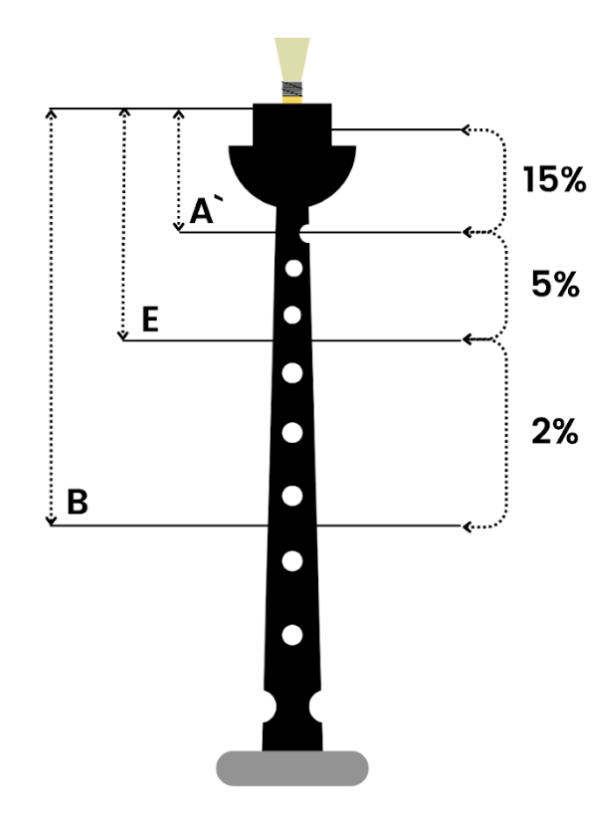
Setup and balance your chanter (the easy way).
I've seen a lot of stuff on the internet about balancing a chanter. And, make no mistake, balancing your chanter is important! But, there's no need for it to be complicated.
The solution is – simply integrate chanter tuning as part of our simple, reliable, tuning routine (or in other words, as part of our algorithm)?
That's what master pipers are doing; that's what we're going to teach you to do!
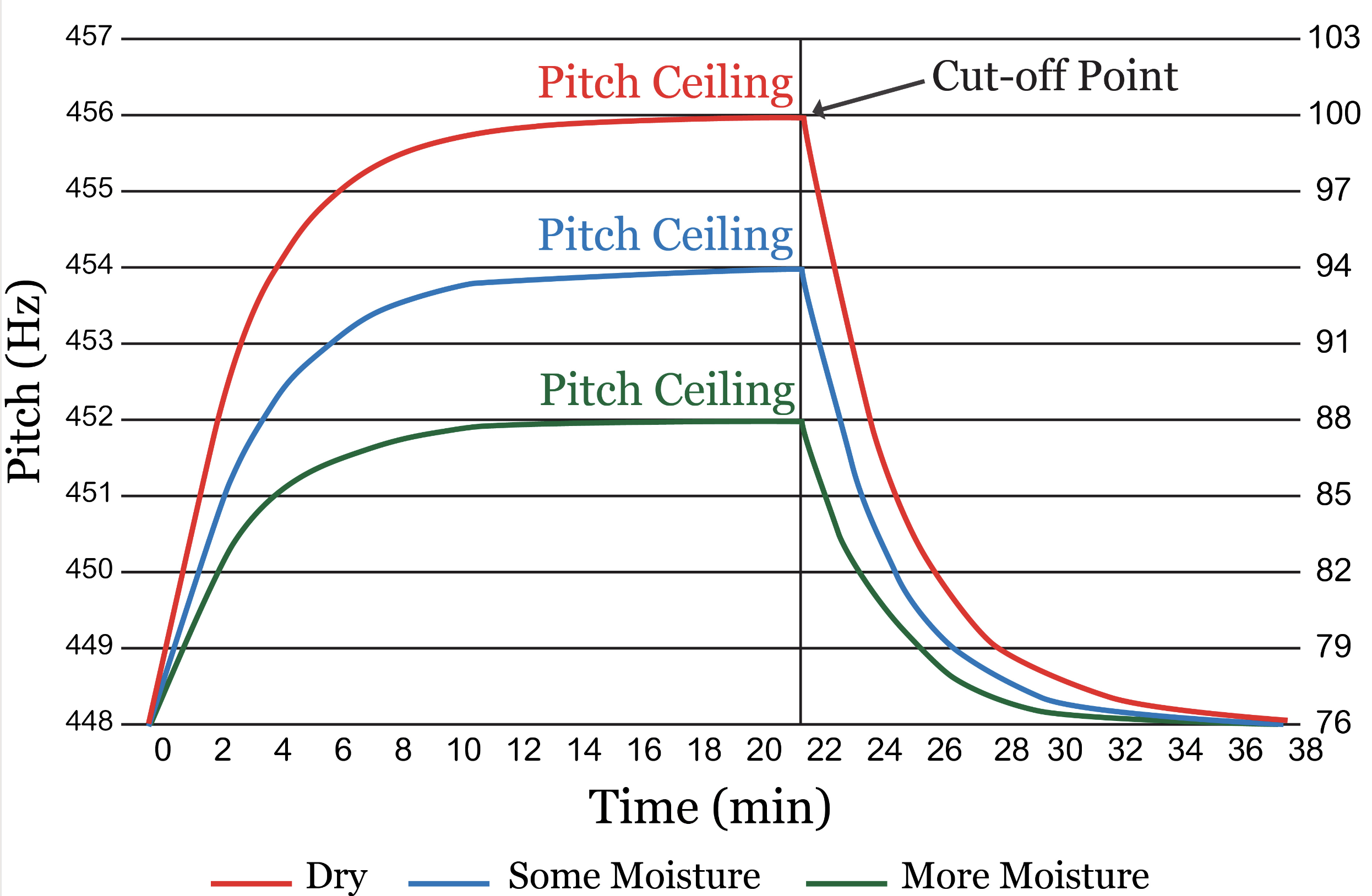
Tuning not holding? We've got the "answer" for you (sort of...)
I've got some troublesome news – your bagpipe tuning is never going to fully hold. There are too many variables inside and outside of your bagpipe to promise that. (That's why even the best pipers in the world need additional tuning time immediately preceding their performances).
However, we can teach you to learn to predict exactly how your pipes are likely to change over time. And, we can teach you to quickly, efficiently cycle through your tuning routine to absolutely maximize your bagpipe's stability. That's the name of the game, and we study that in depth in this tuning suite.

Moisture control, altitude, manipulations, oh my!
There are a million and one "little things" that can potentially complicate and/or benefit the tuning process, and I'm thrilled (and frankly, exhausted!) to say – we cover them all in this course.
What effects does "X" have on your tuning? There's no shortage of theoretical and practical explorations of, well, all the "X"s you can think of.
"The Great Bagpipe Tuning Algorithm" -
Course Details
In this comprehensive course, you'll learn everything you need to know to master the complex process of bagpipe tuning, one step at a time. The first two modules build the foundation of all bagpipe tuning...

Module 1: Bagpipe Tuning In Theory
Algorithm “Output” – Understanding the goal of bagpipe tuning.
- Algorithm Output – The “Two Checkboxes” of Bagpipe Tuning
- Capt John A. MacLellan, MBE (1921-1991)
- The Production of Sound
- Musical Sound
- How the Bagpipe Produces Musical Sound
- Harmonics, Timbre, Response
- Algorithm Output (Quiz)
But, do you have "the ear"?
- How We Hear Frequency
- In Tune Vs. Out of Tune – Beats (You Can Hear Them)
- Listening Experiments
- Trial and Error; Flat vs. Sharp vs. Testing
- But, Do You Have the Ear? (Quiz)
Algorithm “Procedures” – the Theory of Bagpipe Tuning Technique
- A brief time-out for a word from your sponsors – maintenance and blowing control
- Trial and Error – Digging a little deeper
- Tuning Two Drones Together – The “Radio Tuning” Trial-and-Error Technique
- Tuning Drone(s) to Chanter – the “Blow Trick” Trial-and-Error Technique
- Conclusion: Congratulations aren’t in order
- Algorithm Procedures (Quiz)
Algorithm “Inputs” – Bagpipe Tuning "in Real Life"
- The Bagpipe is a Complex System
- Four Categories of Bagpipe Tuning “Inputs”
- Category 1: Instrument Configuration Inputs
- Drones: how can their configurations be adjusted to affect tuning?
- Chanter: Reed Seat Depth (Graduated Tuning Effect)
- Chanter: Tape
- Chanter: Reed Manipulations
- Mythological/Extreme Considerations
- Chanter/Reed Selection
- Other configurations (that play a role in tuning)
- Category 2: Air Pressure Inputs
- Category 3: Environmental Conditions Inside the Bag
- Environmental Conditions – the Basics
- Relative Humidity and Condensation – a Crash Course
- Internal Environment and its Effects on Pitch, Stability, and Richness
- Critical Thinking: “Moisture Control” Systems
- Putting It All Together - the “Pitch Time Continuum”
- Category 4: Environmental Conditions Outside the Bag
- External Temperature
- External Humidity
- External Condensation
- Direct Sunlight
- Altitude
- Algorithm Inputs (Quiz)
Implications and Good Practices
- Speed → Iterability → Accuracy – We need to develop our tuning skills “to go”
- Timing Strategy is Crucial
- The Goldilox Equilibrium & “Acclimatization”
- Storage Practices are Crucial
- It’s Time to Put Down the Tuner
- Embracing the Iterative Mentality
- What's Coming Up

Module 2: Bagpipe Tuning in Practice
The Four Cornerstones
- The Four Cornerstones of Tuning Technique
Cornerstone 1: Steady Blowing
- Steady Blowing "Baseline" Exercise
- Steady Blowing Variant Exercises
- Avoiding Blowing Anomalies
Cornerstone 2: Tuning Multiple Drones Together
- Tuning Multiple Drones Together – Discussion
- The Radio Tuning Technique – Two Tenors
- The Radio Tuning Game
- Tuning Bass and One Tenor Together
- Tuning Three Drones Together
- Observe the Effects of Drone Reed Configuration
Cornerstone 3: Tuning Drone(s) to Chanter
- The Blow Trick – Discussion
- Tuning One Tenor to Low A with a “Third Hand”
- Tuning One Tenor to Low A Using the Blow Trick (with and without manometer assistance)
- Tuning Chanter Note(s) to Tenor Using the Blow Trick
Cornerstone 4: Putting It All Together
- Discussion
- Practicing Chanter "Ignorance"
- Chanter-First Method
- Drones-First Method
Additional Content:
- Use the Blow Trick to Observe Tuning Theory Firsthand
- Tuning In Motion – a Playing Session
- Sabotage!
Building on the Foundation:
Bonus Tuning Suite Features
Modules 1 and 2 illustrate and develop the core tuning theoretical and practical foundation any bagpiper needs to succeed. From there, the sky is the limit! In our Tuning Suite, we augment this foundation with the inclusion of some key tools.
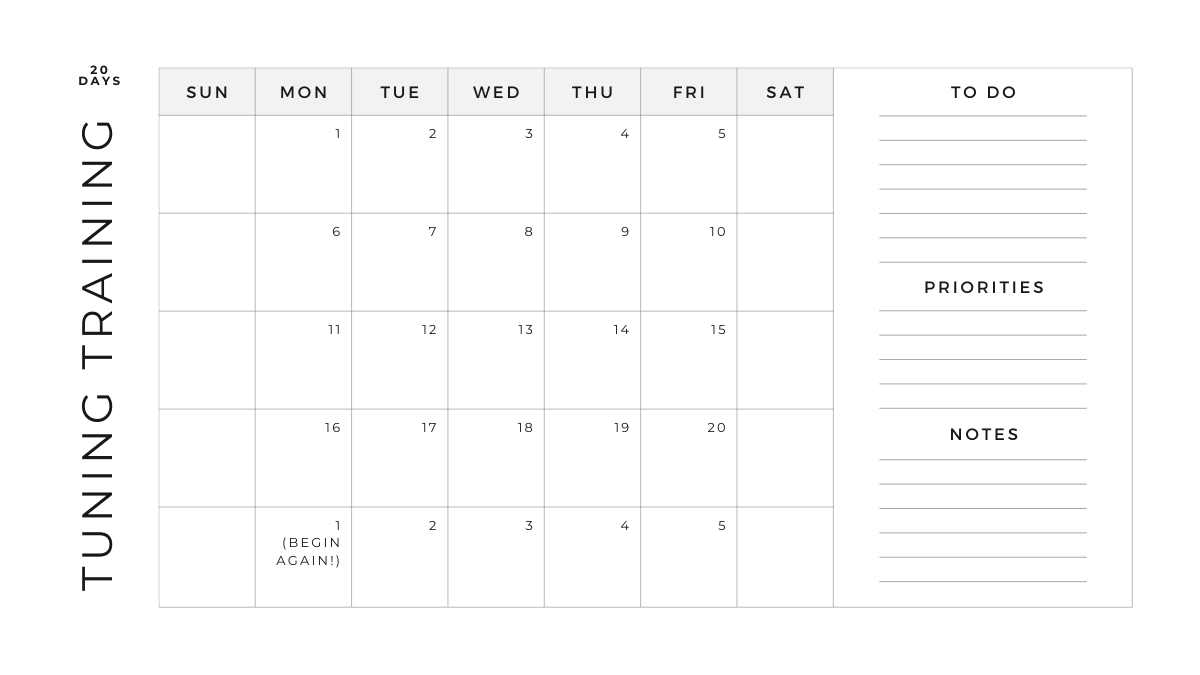
Module 3: The 90-Day Tuning Training Program
Oftentimes course work contains great information, but it's not always clear how to implement it. This 90-day plan, developed specifically for those who have absorbed our course, gives you a cyclical development plan to integrate into your practice session for 90 days. Do this plan, and we guarantee you'll be thrilled with your improvement.
Designed to only take a few minutes each day, this plan can be part of any practice schedule, no matter how scarce your time is.

Module 4: Tuning Master Interviews
After drafting my original tuning course, I knew I needed to interview the best pipers in the world and ask them about tuning. Why? Because I speculated that we all basically tune our instruments the same way. I hypothesized that there's a reason why we use the techniques we do, and resultantly all pipers find success using the same methods. What was the result of this hypothesis? I'll let you decide!
As a bonus feature of this course, enjoy tuning interviews with:
- Richard Parkes MBE
- Jim McGillivray
- Roddy MacLeod MBE
- Lincoln Hilton
- P/M Robert Mathieson
- Stuart Liddell MBE
- Dr. Matthew Welch
- Colin MacLellan
- Callum Beaumont
- Jack Lee
- Matt MacIsaac

Module 5: How to Tune Your Pipe Band Algorithmically
Before understanding "the Great Algorithm", it might have been hard to believe that tuning a pipe corps, even a Grade 1 pipe corps, is simply an application of the same basic procedures pipers use to tune themselves individually!
As part of your purchase today, receive an additional 2-hr "mini-course" illustrating the "onion method" of tuning a pipe corps.
There's no surprises here! If you can tune yourself well, you can tune your pipe corps well.
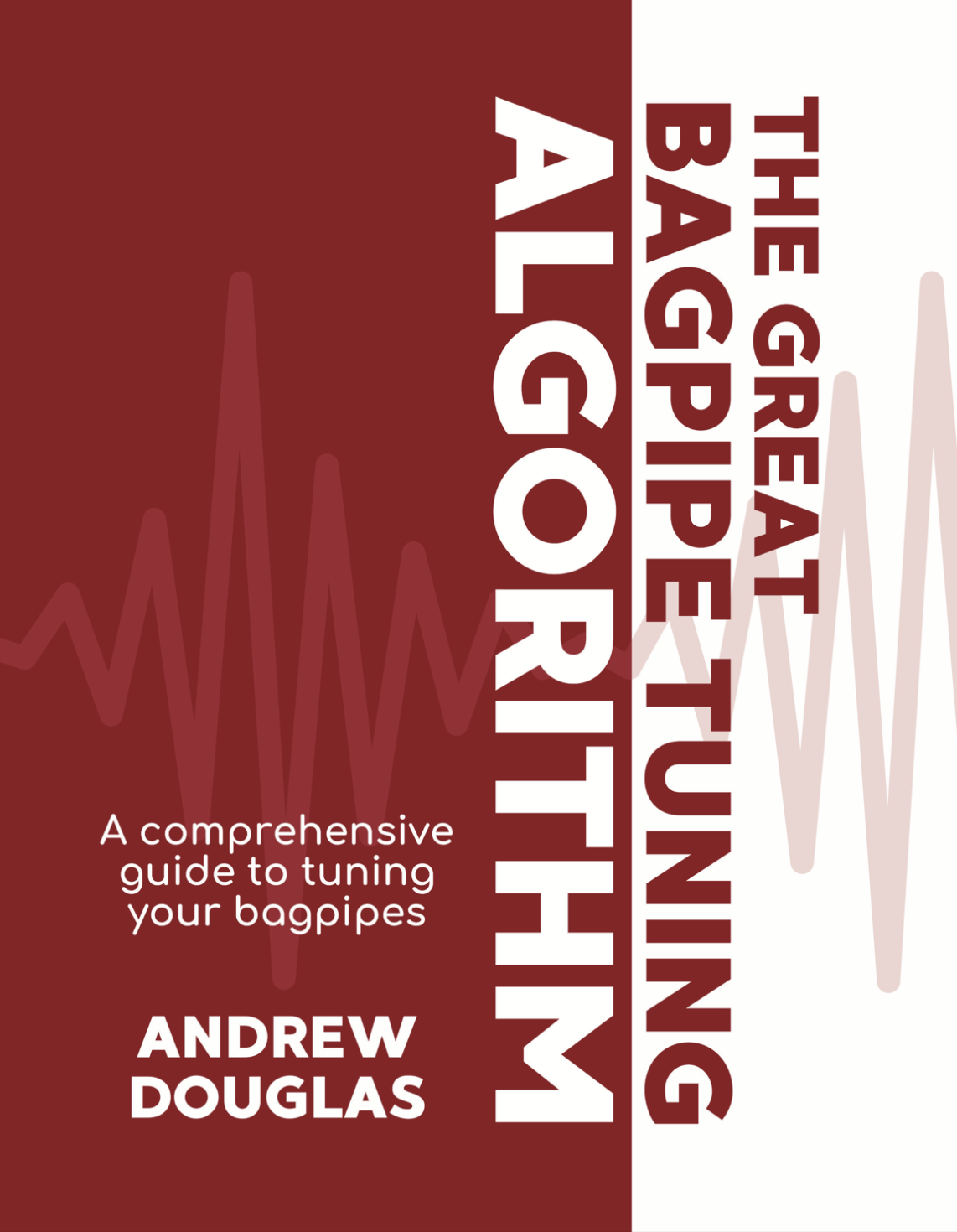
Included With Your Purchase
The Great Bagpipe Tuning Algorithm Text Book

sheila stewart
"It's the most comprehensive course I've ever come across. I think I liked the videos probably the best, because they're broken down into bite sized bits. I did go back and review each step several times. Andrew's teaching is clear, it's patient, and very supportive. He demonstrates everything very well, including not just how to move a drone up and down to attain sound, but also the effect that changing a bridle or changing the depth of a reed seat, or, heat and humidity would make on your sound."

dan cameron
"I think the best testament is probably to play a short tune to show you how I've improved in my tuning."
We'll put our money where our mouth is.
Triple-Your-Money-Back Conditional Guarantee
This is a big course, and we don't want you to invest without knowing for sure there's no risk to you.
If you complete the course materials, including the 90-day tuning training plan, and aren't thrilled with the improvement in your tuning, we'll triple your money back.
Some terms and conditions apply (see the FAQs below), but there's no tricks. If you do the course and aren't successful, we pay, not you.
Just $249 + Shipping
Or three payments of $56.33

Special pricing expires Sunday, October 22nd at Midnight New York Time.
You missed out!
The "Great Algorithm" Tuning Suite - What You'll Receive:
- In depth "Bagpipe Tuning in Theory" Module, with quizzes to test your knowledge
- Comprehensive "Bagpipe Tuning in Practice" module
- 90-Day Tuning Training Plan
- 11 full-hour interviews with many of the world's greatest pipers (!!!)
- 300+ Page Full Color Textbook
- "How to tune your pipe corps" expansion course.
- Triple-your-money-back guarantee
Course Details:
Tuition: Just $249 plus shipping.
Payment Plans: 2- and 3-month payment plans available.
Level: Beginner through Advanced (any piper on the full pipes needs to understand "the algorithm").
Setting: Online/Virtual
Course Length: 15-20 Hours
Expected Completion Time: 1-3 Months (Depending on how hard you work!)

100% Satisfaction Guaranteed, with conditional triple-your-money-back guarantee.

Secure Payment
Special pricing expires Sunday, October 22nd at Midnight New York Time.
You missed out!
Andrew Douglas
Creator of the Piper's Dojo and Dojo University
About Andrew
“My name is Andrew Douglas and I'm the founder of the Piper's Dojo and creator of Dojo University, our online learning portal for bagpipers. I'm super excited to be your guide as we drill into some of the most essential fundamental elements of being a great piper... we'd be honored to have you aboard!"
— Andrew Douglas
A bit more about Andrew:
- Founder, Creator, and CEO of the Piper's Dojo and Dojo University
- 2017 & 2019 World Champion with Inveraray and District Pipe Band
- 2017 Winner of USA Silver Medal for Piobaireachd
- 2008-2013 Pipe Major of Grade 1 Oran Mor Pipe Band
- Multi-prize winner, Silver Medals at Oban and Inverness
- Former Winner of B-Grade Strathspey/Reel at Oban (2004)
- Accredited Bagpipe Teacher and Examiner with the Scottish Qualifications Authority

100% Satisfaction Guaranteed

Secure Payment

100% Satisfaction Guarantee
In addition to the conditional triple-your-money-back guarantee outlined above, all Dojo University purchases are also always eligible for a full refund (for any reason) within 30 days of purchase. If you are unsatisfied with our Tuning Suite for any reason, you can even keep your text book, and finish out your Dojo U free trial. Simply email us before 30 days is up, and we'll process a full refund for your Tuning Suite.

Frequently Asked Questions
Is this course right for my ability level?
This seems like a lot... how much of a commitment is this?
Can I take this course on my phone/tablet?
How long will it take to access my course when I deliver it?
Can I download the course to watch offline?
Can I have more information about your guarantee?
Last Minute Bonuses!!!
$100 Off a Set of MacLellan Bagpipes (must purchase Tuning Suite before Oct 22)
MacLellan instruments are crafted from the finest materials, using traditional skills originating in Scotland. Attention to detail and dedication to the highest standards of quality -- guarantee a bagpipe which is more than just a musical instrument, but also a work of art.
A special thanks to the team for sponsoring our Tuning Suite students with $100 off the purchase of any set of pipes from MacLellanBagpipes.com
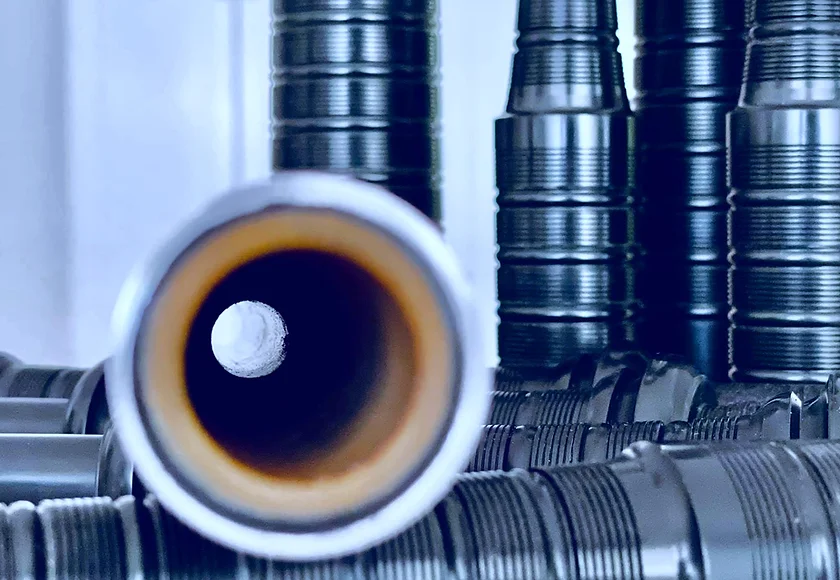
2 Free Chanter Reeds from Castle Bagpipes (must purchase Tuning Suite before Oct 22)
Castle Reeds are chisel cut, with a rolled copper staple that is expertly manufactured and meticulously tested in Kirkcaldy, Scotland by Greig Canning.
A special thanks to Greig for offering Tuning Suite students 2 free reeds to try, you just pay shipping!
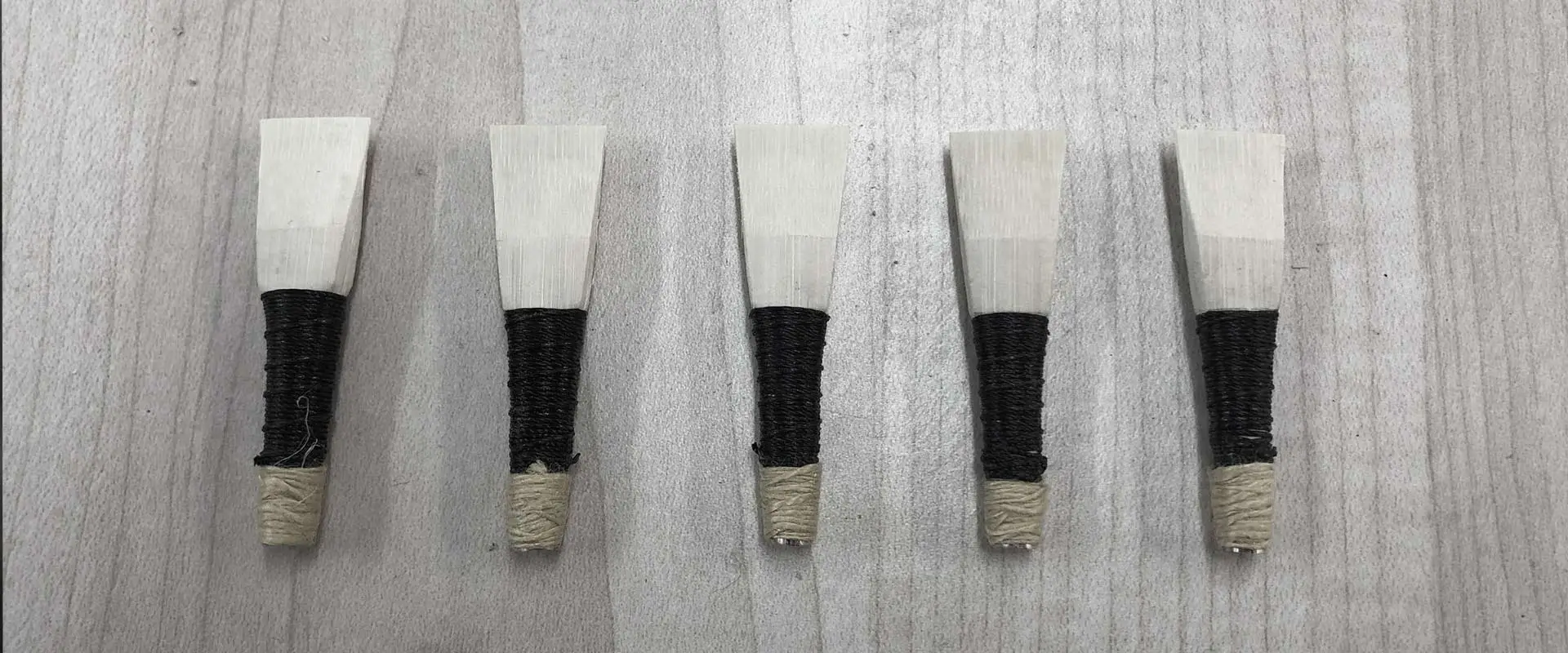
Free Dojo University Membership Trial
Non-current members (optionally) receive a free 1 month trial of Dojo University Premium - our flagship membership product! Enjoy live classes, a limitless archive of past materials, bagpipe courses on every topic imaginable, and participate in our internal "Discord" community.
Existing Dojo University Premium members will automatically receive two months of free Dojo U credit upon purchase of the Tuning Suite today. That's a $90 value!
Dojo University Is Different
Yes, you can find bagpipe instruction elsewhere on the internet and in person, but Dojo University is unique because it's built and taught by real-world bagpipers who have actually built these resources based on real-world experience (read: successes).
In other words, we aren't people who couldn't do so we made a course instead. We've been in the trenches teaching AND performing - we detest untested theory and believe that the best way to learn something is to roll up your sleeves and get your hands a little dirty. If that sounds appealing, then welcome! In Dojo U you've found your bagpipe home.

TUNING INTERVIEW EXCERPTS
Jim McGillivray
In this interview, Jim and I discuss his early experiences tuning, and how he basically just had to quit playing out of tune "cold turkey." We also discuss the importance of pressure variance as a tool to test how to bring the pipes into tune.
This is just an excerpt! Full interview length approx. 60 mins.
Colin MacLellan
Has bagpipe tuning changed much over the centuries? Not only is Colin a legendary piper in his own right, but he's also the son of Captain John MacLellan, one of the most famous pipers from the previous generation.
This is just an excerpt! Full interview length approx. 60 mins.
Roddy MacLeod, MBE
In this interview, we discuss the basics of bagpipe tuning, how Roddy goes about teaching tuning to students, and maybe, JUST maybe, we'll get a glimpse into how to create the Roddy High A...
This is just an excerpt! Full interview length approx. 60 mins.
Stuart Liddell, MBE
How does Stuart dial his bagpipe into tune? In this hour-long interview, we discuss his process, how the bagpipe changes in tuning over time, and we pick up quite a few tips and tricks along the way.
This is just an excerpt! Full interview length approx. 60 mins.
Matt MacIsaac
Trial and error is the secret weapon of great bagpipe tuners. But just what does that mean? How does a piper learn to fall in love with the (oft torturous) process of bagpipe sound production?
This is just an excerpt! Full interview length approx. 60 mins.
Lincoln Hilton
Lincoln is an incredible composer, but let's not overlook his mastery of the bagpipe. His journey to tuning perfectionism was, and continues to be, a result of obsessive trial and error. Wide-ranging, mind-blowing insights ensue!
This is just an excerpt! Full interview length approx. 60 mins.
Callum Beaumont
When pipers play on the biggest stages in the world, what does their preparation look like behind the scenes? Sure enough, the greats need to cope with internal and external environment challenges, and ensure their setup and technique is spot on, in order to be successful.
This is just an excerpt! Full interview length approx. 60 mins.
Pipe Major Robert Mathieson
In this interview, the many-time world champion Pipe Major of Shotts talks about the ins and outs of bagpipe tuning, the effects of external temperature on the pipes, the "flowering" effect that moisture can have on the instrument, and more!
This is just an excerpt! Full interview length approx. 60 mins.
Copyright - Piper's Dojo LLC

